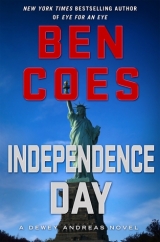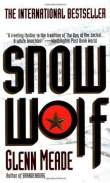
Текст книги "Independence Day "
Автор книги: Ben Coes
Жанры:
Боевики
,сообщить о нарушении
Текущая страница: 6 (всего у книги 28 страниц)
11
WHITEWATER MMA
WASHINGTON, D.C.
The man in the wheelchair stared at Dewey, then turned to Daryl.
“Where’s Tino?”
Daryl leaned forward, between the ropes.
“You think that’s a good idea?” Daryl asked quietly.
“Get him,” he snarled.
Daryl stood up and searched the crowd. His eyes settled on the window at the rear of the room. A dark-skinned man was seated on the windowsill. He had earbuds in, seemingly oblivious. Daryl motioned for him, but he wasn’t paying attention. Someone reached up and tapped him on the arm. The kid looked up, found Daryl, then stood.
People started to shout and clap as Tino made his way to the ring, unbuttoning a sleeveless flannel shirt as he came close and dropping it to the floor. Reflexively, people stepped aside to let him through.
Tino wasn’t overloaded with muscles, but what he did have looked sculpted, as if he managed his muscle tone around fitness, speed and, above all, violence. He walked bowlegged, bending his head side to side as he walked, stretching his neck. His chest was bare. As he climbed into the ring, and the cheering picked up, Dewey saw his one and only tattoo, a foot-wide picture of Jesus across his back.
He wore long nylon shorts that came below his knees. He climbed into the ring and walked to the corner, ignoring Dewey.
The crowd was amped. They called out Tino’s name in a prideful chorus.
“Tee-no! Tee-no!”
Dewey glanced at Daryl.
“I’ll make the same offer as before, man,” he said to Dewey, “but I know what you’re gonna say.”
Dewey didn’t respond. The truth is, though he heard what Daryl said this time, the meaning of the words seemed to sail over his head, as if they were in a different language.
All Dewey could hear now was the warmth. It had gotten there, to that level he’d grown to know and trust, when it guided him, when it spoke to him.
He’ll try to kill you. He wants to kill you. The question is, are you going to let him?
Daryl stepped to the center of the ring, motioning for Dewey and Tino to meet him there.
Tino continued to ignore Dewey as the two approached Daryl. Then he looked up and their eyes met. They were dark eyes, almost black. He smiled. He had no upper front teeth, just a big gaping hole. He stared at Dewey, studying him.
“What branch?” Tino asked, barely above a whisper.
Dewey didn’t answer. He was in a different place. He couldn’t even hear the din of the gym. The shouting was loud now. There was a sense of riot and chaos. He heard only his own thoughts.
It’s time to return. Now is that time.
“Three-minute rounds,” said Daryl, yelling so that Dewey and Tino could hear him above the clamor of the crowd, now five deep around the ring.
Daryl leaned toward Tino.
“When I say stop, you stop, and I’m fuckin’ serious, Tino.”
Tino smiled and began to bounce on his feet, back and forth, left right, staring at Dewey.
“Other than that, well, have at it, motherfuckers,” said Daryl, stepping back, motioning to the corners.
Daryl nodded to someone seated ringside. Suddenly the bell sounded, and the fight began.
Dewey stepped toward the center of the ring. Tino remained in his corner, adjusting his mouth guard. He seemed nonchalant as he did so, not even looking at Dewey. Dewey moved closer, and yet Tino seemed oblivious; he made eye contact with someone in the audience, smiled, then removed his mouth guard. He yelled something to him. His head was turned sideways to Dewey. Dewey came closer now, his fists raised, clenched, waiting for Tino to turn back to him, and in that momentary pause, Tino burst left—like a lion hurling itself through the bush at unsuspecting prey.
Dewey caught the move, but too late. He tried to block the attack, swinging at Tino’s head, but by the time his fist slashed right to left, Tino’s head was gone, dropped down beneath Dewey’s arm as he charged at Dewey’s legs—lurching viciously headfirst at Dewey’s thighs. The moment of anticipation, caused by his own error, was painful. Tino’s skull slammed his left thigh, as hard as a sledgehammer. The shock of the attack was unexpected, the pain brutal and immediate. Dewey felt lightness as Tino drove him hard, backward, then, for an awful second, into clear air. Before he hit the mat, Tino’s arms were around his legs, his sharp fingers ripping at the back of his legs, trying to break the skin. Then Dewey landed, Tino atop him. His back struck the mat, followed by the back of his head. In the fiery moment, he heard Tino’s grunt, a terrible sound, intermingled with pain in the front of his thigh and the dull, deep migraine that shot out from the back of his skull.
The gym erupted in screaming and cheers.
It took all of ten seconds, and Dewey knew he was in deep trouble.
The crowd moved closer, bunching up the sides of the ring, yelling at Tino, egging him on.
“Break it!”
“Bury ’em, Tino!”
Dewey lay on his back, locked at the thighs in a viselike grip. He slammed his fists into the back of Tino’s skull, his neck, and the upper part of his back, eliciting not even a grunt. Then Tino’s knee shot up from beneath him and hit Dewey squarely in the balls. A half second later, Tino’s right arm sprang loose from around Dewey, swinging wildly for Dewey’s face.
Dewey anticipated the move, raising his left arm, blocking Tino’s swing. Then, with his right hand, Dewey grabbed whatever he could of Tino’s moving fist, finding Tino’s middle and index fingers, then snapping back, breaking both fingers at the knuckle just as Tino’s other fist slammed hard into Dewey’s right biceps.
Tino grunted in pain as he swung again with his left, striking Dewey in the shoulder. Dewey’s right arm shot out, then under Tino’s elbow, locking Tino in an awkward position. Dewey yanked upward with his right arm, trying to snap Tino’s arm at the elbow. But Tino moved to escape. From atop Dewey, he pushed with his head, his right hand, and his legs, then jumped up into the air in a controlled pirouette, a 270-degree sideways leap that freed him from Dewey’s grip. He landed on his feet.
Dewey rolled left, but not in time to avoid Tino’s bare left foot, which kicked him viciously in the mouth. Blood shot out. Tino followed the first kick with another, his right. Dewey blocked it, then swept his legs across the mat, beneath Tino, kicking Tino hard at the ankle, dropping him.
Nauseous, dizzy, badly bleeding, Dewey climbed to his feet.
Daryl, the referee, stood in the corner, arms crossed, watching with a blank expression on his face.
It felt like they’d been at it for hours, but for the first time Daryl made a motion: two fingers. Two minutes left in round one. Only a minute had passed.
“Motherfucker,” Dewey panted, blood coursing down his chin and onto his chest as he regained his knowledge of what it felt like to stand on his own two feet.
* * *
Bond parked his Audi S6 on a quiet residential street off Wisconsin Avenue in Georgetown. He found the alley that ran behind the line of town houses that included Dewey’s. He scaled a brick wall that bordered the small backyard, slipping quietly over the top without making a noise.
Once inside the darkened property, he climbed a tree until he came to a branch that hung over a third-floor eave, then jumped to the terrace. He took a thin, hard titanium card from his wallet and slid it into the seam between upper and lower windowpanes. Bond jimmied the latch open, climbed in, and took the stairs to the first floor. There he found the case of beer along with a small collection of empties. Next to it was a bottle of Jack Daniel’s, a third of it depleted. On the side of the bag, he saw a word scrawled in chicken-scratch handwriting: WHITEWATER.
Bond sighed. He took out his cell and started to dial Calibrisi. Before he hit Send, however, he stopped. He put the phone back in his pocket and stepped to the front door. He didn’t want to pass it off to Calibrisi. He wanted to help.
Back on Wisconsin, he hailed a taxi instead of driving. He knew if he drove his Audi to Whitewater he’d likely never see it again.
* * *
After the first big scrum, Dewey and Tino were squared off along the edge of the ring, Dewey catching his breath, Tino studying an opponent he should’ve already beaten. They didn’t bother circling each other. Dewey had his left hand on the rope, clutching it for stability. Blood poured from his mouth. Splatters of fresh crimson dotted the mat.
Tino’s face was bright red and drenched in sweat. His left fist was shut. His right fist was open. A pair of broken fingers jutted unnaturally into the air.
The crowd was in a frenzy. In unison, they chanted Tino’s name, urging him on.
Dewey glanced to his left, ringside, through the opening in the ropes. The man in the wheelchair was staring at him.
As much as Dewey wanted the rest that would come with the end of the round, he knew that if he didn’t end the fight now, he would likely die in the second round or, worse, have to forfeit.
Don’t be afraid to die.
Dewey stepped into Tino’s range, slowly and deliberately. As he did, his eye was drawn to the wall near the door at the back of what was now a standing-room-only crowd. There, he saw Bond, his arms crossed, watching. Bond noticed Dewey’s glance. He nodded at him but remained in back.
Dewey moved closer to Tino. He jabbed the air in front of him, punching left right, as if he was softening up an invisible layer of protection in front of Tino.
It’s time to return, Dewey.
Tino charged. Like before, it came out of the blue. His bare feet battered the mat as screaming and cheers erupted from the crowd.
This time Dewey was ready.
Tino lurched at Dewey’s midsection, diving, hands out, a low, guttural scream emanating from his throat as he again sought to take Dewey to the mat. Dewey waited one moment, then another, timing it, watching as Tino came within a few feet, then a foot, then inches, tuning out Tino’s grunt, which was supposed to distract him, to instill fear in him. Dewey felt it then, not small traces or even just a burst of it. He felt the fire of the adrenaline hitting his entire body. He lashed his right foot high into the air as Tino’s fingertips made their initial brush against his torso. His kick was brutal and deadly accurate, greeting the right side of Tino’s skull with a punishing thud. Whatever momentum Tino had was immediately interrupted. His head snapped awkwardly sideways. He tumbled to the right and down to the mat, dropping onto his back near the rope, helpless, stunned.
The crowd was silent. Mesmerized. Dewey remained focused on his prey, wiping his bloody mouth with the back of his hand. He bounced ever so slightly on the balls of his bare feet as he stood over Tino, waiting for him to get up.
Tino gathered himself to his knees, then looked up, expecting Dewey to kick him, but Dewey remained squared off, fists clenched, blood dribbling from his mouth.
“Get up,” he mumbled.
Tino got to his feet, shaking his head, trying to knock the proverbial cobwebs out. Dewey moved in. They punched at each other, back and forth, their fists flying so quickly that most could barely register the number of contacts. Every time Dewey started to create a series of successful punches, Tino’s leg would come out of nowhere, either his foot or knee, catching him anywhere he could, but Dewey was winning the fistfight. Tino’s left eye was cut, swollen shut, and bleeding. His left cheek was covered in a sheen of blood, as were his shoulder and arm.
Dewey punched Tino back into the corner, ignoring his kicks, absorbing them, beating on Tino’s head. Tino moved his fists up to protect his head. Dewey lowered the focus of his punches to Tino’s torso.
Beneath Dewey’s withering pounding, Tino seemed to duck down, behind his hands.
“Stop,” Tino muttered, barely above a whisper, loud enough for Dewey to hear, but no one else.
Dewey stopped punching long enough for Tino to lurch up at him, headfirst, the front of his skull striking Dewey above the left eye, sending him flying back to the mat, where Tino pounced on him and began to punch and knee him furiously.
All Dewey could feel was the numbness that precedes the sharpest of pains, and at the front of his head, the fog of a concussion.
Somewhere in the distance, Dewey heard the bell, ending the round. Tino kept punching until, a few seconds later, he heard Daryl yelling at him to get off.
Dewey struggled to get up. He put a hand down and started to push up but spilled over onto his side. He was dizzy and nauseous. He climbed to his knees, weaving, then grabbed the rope. He vomited over the side of the rope as he clung to it. Dewey crabbed along the rope to his corner. There was no stool, but an arm handed up a bottle of water. Through his open right eye, Dewey saw a young black kid staring up at him.
Daryl came over.
“I can DQ him for the head butt,” he said.
Dewey took a sip of water, spat it out, then focused his eyes across the ring. Tino was sitting on a stool.
“No,” Dewey said, shaking his head.
“I thought I heard him call ‘stop,’” said Daryl.
Dewey’s eyes remained transfixed on Tino. His dizziness was quickly abating.
“No,” groaned Dewey. “He didn’t call ‘stop.’”
A half minute later, the bell clanged for round two.
Dewey stepped to the center of the ring, weaving slightly, his fists down at his sides. He watched Tino as he circled him. The crowd was quieter now. There were still chants of “Tino, Tino,” but they were fewer and farther between.
Dewey didn’t move his feet. He stood still, moving only his head, tracking Tino out of the corner of his eyes as he circled him.
It’s time to return. Your job is not done.
Dewey waited for the moment when he could no longer see Tino. The blind spot, behind him, shielded by his swollen left eye, out of reach of his right. His training came back to him: Delta, advanced hand-to-hand combat tactics, taught over a grueling summer in the Utah desert, almost always at night.
You will learn to fight during the day, but you will come to know the night. Darkness is the adversary of most, but not Delta. We will teach you the night.
Dewey shut his eyes. He listened for Tino’s guttural panting. With his feet, he waited for the infinitesimal movement on the mat as Tino came closer.
He felt it behind him, then heard it, the movement, the patter, as Tino suddenly charged.
When you are the night, there is no man alive who can stop you. There is no man who you cannot kill.
Dewey waited, focusing on Tino’s low grunts as he charged, feeling the mat concave slightly, hearing the footsteps, then, at the final moment, sensing the presence of another animal as it descended.
He guessed Tino would dive for his knees.
Dewey pivoted, opened his eyes, then jumped into the air.
Tino dived across the air beneath Dewey as the crowd let out a cacophonous, spontaneous cheer. Tino braced himself for the coming fall, landing on his hands, then leapt up. He turned.
Dewey raised his fists and stepped toward Tino. Tino raised his fists. They came closer, slowly hovering in front of one another, just out of reach.
Dewey moved closer, slowly, weaving slightly, and entered Tino’s range. Tino swung, hitting Dewey in the chest. Dewey let the fist strike him, then another, this time across the chin, before swinging a brutal roundhouse at Tino’s head. But Tino ducked. In a single fluid motion, Tino kicked his left leg out sideways, a fierce boot to Dewey’s ribs, pushing Dewey backward, making him grunt in agony. Tino followed the kick with a 270-degree roundhouse recoil, left foot pivoting on the mat, right swinging clockwise toward Dewey’s head.
Dewey met Tino’s outstretched foot with a braced left forearm, which he slammed up just as the foot made contact, thrusting at Tino, sending him flying over backward. Tino’s eyes went wide, knowing what was about to happen. The crown of his skull hit the mat before his hands had the chance to stop the fall. As Tino landed, then rolled, Dewey stepped toward him. At that moment, he could’ve kicked him. He could’ve easily crushed Tino’s nose and snapped his head back hard enough to do permanent damage, the kind of damage Tino had been trying to do to him. But he didn’t. Instead, Dewey stood above him. With blood still dripping from his mouth, Dewey waited, fists clenched, in case Tino decided that he wanted more.
Daryl moved to Tino, kneeling. He grabbed his ear, lifting his head slightly so that he could see him. Tino looked up, his eyes meandering around inside the sockets. He shook his head, resigning from the fight.
The crowd was silent for a few moments. Someone started clapping. Dewey looked down to see the black kid, smiling widely, looking up at him. Soon the gym grew louder as others joined in.
Dewey moved to the rope. He lifted it and climbed down. He started to walk toward the door, but turned. Then he saw the man in the wheelchair. He nodded at Dewey. Dewey returned the gesture with a blank stare.
Near the entrance, Dewey found Bond, leaning against the wall, arms crossed.
“You almost just got killed,” said Bond.
“Yeah, no shit,” said Dewey, touching his eye.
“You realize you just took down the top-ranked UFC prospect in the United States?” asked Bond.
“I wish someone had told me that before I got in the ring,” said Dewey, rubbing his eye. “How the hell’d you find me?”
“I broke into your town house.”
“That’s breaking and entering. You can get a ticket for that in D.C.”
“Sue me.”
“Hector send you?”
Bond nodded.
“I can’t imagine why he’d be worried about you,” said Bond, shaking his head. “Let’s go.”
12
ABOARD THE LONELY FISHERMAN
MEDITERRANEAN SEA
Faqir stood in the wheelhouse, chain-smoking cigarettes, his eyes flashing between the rudimentary navigation equipment and the four-foot waters of a wind-driven ocean, illuminated now by halogen lights at the trawler’s foredeck. It was almost midnight.
The wooden deck of the trawler was soaked in seawater. The steel along the balustrade was rusted. Near the bow of the ship, a watch tower stood thirty feet high, put there in order to spot schools of tuna. A cable was draped between the tower and the wheelhouse. Christmas lights were wrapped around the cable, though most of the bulbs were burned out. The few that remained created a dim, murky glow on the deck.
The wheelhouse had a strong stench of fish, body odor, oil, and cigarettes.
The boat was chugging along at twenty-four knots, thick smoke spewing from a pair of stacks behind the wheelhouse. The engine was loud and made an unhealthy grinding noise. It didn’t, however, concern Faqir. Not only had he crossed the Atlantic in far less seaworthy vessels, he also had the preternatural calm of a jihadist. He didn’t care if he died, believing in his heart that whatever was next was paradise.
It had been twelve hours since they’d refueled in Bizerte, on the coast of Tunisia. By Faqir’s estimates, the trip through the Strait of Gibraltar would take another day. Until then, Faqir did not intend to leave the wheelhouse.
He heard rapid footsteps on the deck and turned as the door to the wheelhouse burst open. One of the crew stood at the door, panting.
“Vrach dolzhen vam srazu.”
The doctor needs you immediately.
“Sledit’ za ognyami,” said Faqir. “Krichat’, yesli vy vidite kakoy-libo. Vy ponimayete?”
Watch for lights. Scream if you see any. Do you understand?
The young crew member nodded and walked to the wheel.
Belowdecks, Faqir passed the engine room, then came to a large cargo hold near the middle of the ship. Outside the room hung several pink hazmat suits, designed to protect against chemical, biological, radiological, and nuclear exposure. Each had a self-contained breathing apparatus. Faqir put one on, then opened the door.
The bomb lay on its side on a steel frame. A section had been removed, exposing a steel cylinder near the center of the device.
Dr. Poldark, also dressed in a hazmat suit, was standing over the bomb, looking at the cylinder.
“What is it, Doctor?”
“We have a problem,” said Poldark. “The explosives in the gun assembly are shot. They will not work.”
Faqir shook his head.
“I’m not a nuclear scientist, Dr. Poldark.”
Poldark took a deep breath, then smiled patiently. He pointed at the steel cylinder that stuck out from the bomb.
“This is a fission bomb,” he said. “That is the gun assembly. The way it works is simple. At the very end is a conventional high explosive. When that is detonated, it causes a bullet—made of highly enriched uranium—to fire down the barrel into a larger piece of highly enriched uranium at the other end. When it strikes the other piece of uranium, a chain reaction occurs. Critical mass. Boom.”
Poldark patted the steel cylinder.
“The problem is, this bomb is old. It was assembled in 1952 or ’53. I was a teenager then. Your parents, Faqir, were probably not even born yet. That’s how old it is. The uranium is, of course, pristine. It will last forever, or at least long enough for our purposes. But the conventional explosive that begins the chain reaction is, I’m afraid, useless.”
“I brought explosives, Doctor,” said Faqir.
He turned to one of the men standing against the wall.
“Guzny, gde zhe detonatorov?” he barked at the young Chechen.
Guzny, where are the blasting caps?
The Chechen’s eyes darted about nervously. Finally, he spoke, barely above a whisper.
“Ya iskal vezde. Ya, dolzhno byt’, zabyli ikh.”
I looked everywhere. I must have forgotten them.
Faqir’s face turned red as his expression flared in anger. He pulled a handgun from a holster at his waist, raised it, and fired. The slug struck the young Chechen in the center of his forehead, spattering blood across the wall of the hold. He fell to the floor.
Faqir looked at the two other men.
“Throw him in the ocean,” he ordered.
He looked at Poldark.
“I apologize for the incompetence of my man,” he said.
“Without some form of propellant, the bomb is useless,” said Poldark.
Faqir glared at the scientist.
“I will find you explosives, Dr. Poldark.”
“How?” asked Poldark, shaking his head in disgust and resignation. “We can’t go back. There is no way.”
Faqir ignored Poldark.
He turned to one of the Chechens and spoke to him in Akkhiy, an Arabic-influenced dialect of Chechen: “Get the weapons ready. Night optics too.”








